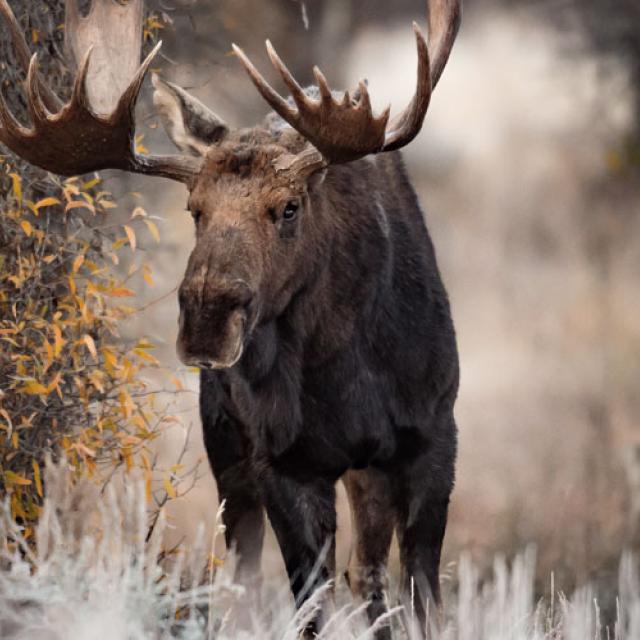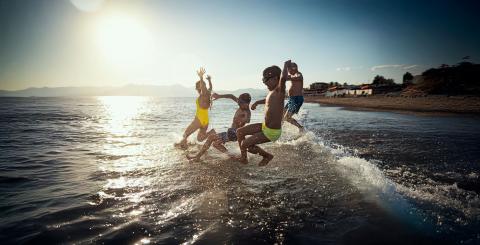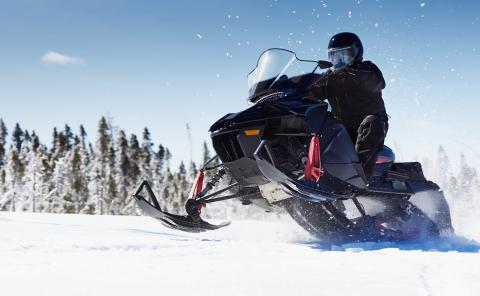Handy guide for hunting in Québec

With woodlands blanketing more than half the land, Québec is a hunter’s paradise. So it’s no surprise that Canada’s biggest province is home to about a half a million hunters. Given the important ecological, cultural, and economic role it plays, hunting is an age-old Québec tradition that is closely monitored to ensure the safety of all hunters and the sustainability of game animals.
We’ve put together this handy Québec hunting guide for hunting enthusiasts of all levels. Find answers to your questions, learn more about the most popular game, and get the inside scoop on hunting territories and regulations, as well as tips on how to have a successful—and safe—hunting experience.
Hunting’s role in biodiversity
Hunting is more than just a sport and an economic draw. It also helps protect biodiversity. Thanks to the regulations the Québec Ministère des Forêts, de la Faune et des Parcs (MFFP) has introduced across the province, hunting is meant to control populations of certain species to preserve the integrity of local plant and animal life. When practiced responsibly, hunting reduces the number of animals in a herd so it can maintain a healthy balance.
What type of game can you hunt in Québec?
Hunting in Québec can be broken down into big game and small game. Big game in Québec includes moose, black bear, caribou and white-tailed deer. Small game includes wild turkey, partridge, coyote, wolf, ruffed grouse, spruce grouse, snowshoe hare, and willow ptarmigan. Migratory birds such as snow geese, ducks, Canada geese, and others are also very popular with hunters in Québec. .
What type of hunting is most popular in Québec?
Moose hunting. It’s a big draw for hunters from Québec and beyond. Every year, some 170,000 moose hunting licences are issued. White-tailed deer is also increasingly popular. And 2020 was the first year that hunters could purchase a second licence to hunt this type of game. Black bear hunting is another key part of the Québec hunting landscape, with some 18,000 licences issued every year.
Handy guide for moose hunting in Québec
What are the typical habits of moose?
Learning and understanding the behaviours and habits of moose is the key to successfully taking down one of these giants. To know whether there are moose in the area, you first have to know what signs to look for. Here are 5 signs that a moose is nearby:
1. Trails
Moose tend to stick to a routine. To save energy, they often take the same trails when traveling through the forest. Given the sheer size of moose legs and hooves, their trails are easy to spot.
2. Teeth marks on bark
When leaves are scarce, moose feed on tree bark, especially red maple bark. The teeth marks are fresh if you can still smell the sap.
3. Droppings
Moose droppings (or scat) change with the seasons. They are fibrous when leaves and aquatic flowers are scarce, muddier when these food sources are abundant.
4. Rutting pit
A moose rutting pit (or wallow) is a hole that bulls dig and fill with urine to attract cows for mating. These pits are easy to identify because of their distinctive appearance and smell. A very pungent pit is a sign that a bull is close by.
5. Scuffed trees
In the fall, scrapes on tree bark 3 to 6 feet high may have been caused by a rutting bull’s antlers.
Where are the best spots to hunt moose in Québec?
Moose are found in many of the forests scattered across Québec. However, some regions are especially prized by moose hunters, including Bas-Saint-Laurent, Saguenay–Lac-Saint-Jean, Laurentides, Mauricie, Gaspésie, Côte-Nord, and Outaouais, to name a few. As a general rule, mature hardwood and mixed forests are the moose’s preferred habitats.
How to pick the best spot for your salt lick
A salt lick is a type of bait used for hunting moose. Salt licks are basically blocks of salt that is sometimes enriched with other minerals and nutrients. The hunting blind is generally placed close to the salt lick, next to fir or spruce trees. It’s important to pick a location that’s quiet, shady, damp, and set back a ways, preferably near a marsh or beaver dam. You can also set a salt lick close to any of the moose signs listed above.
Moose hunting pro tips
Here are a few tips and tricks to help increase your odds of landing one of these magnificent animals:
- Don’t use your ATV near your salt lick.
- Mask your own scent with synthetic urine or urine from a rutting pit.
- Wear clean, dry clothes. Damp clothes have a stronger scent.
- Place two salt blocks of different flavours at the same site.
- Pay attention to the prevailing winds and try to keep upwind so your scent doesn’t give you away.
- Walk whenever possible, especially in rainy and windy weather.
- Mimic the moose’s behaviour by walking slowly and making frequent stops.
- Act like a bull moose by imitating its constant bellowing, breaking off branches here and there, and moving closer to the cow. You can also use a moose antler.
- Look for streams and damp, shady areas where moose hide to cool off on hot summer days.
- Avoid clearings to stay out of their line of sight.
Hunting territories
Québec is divided into 28 hunting zones, many of which are further divided into subzones based on the distribution of game species. These zones include both public and private land. Certain areas, such as controlled harvest zones (ZECs), outfitters, and wildlife reserves, may have specific regulations in force. You need authorization to access private land for hunting. When hunting on public land, you have the same rights as other outdoor enthusiasts without any exclusive rights or priority.
What are exclusive hunting rights?
MFFP leases out exclusive hunting rights in certain territories, generally to outfitters. That means clients of these outfitters are the only ones allowed to hunt in that territory.
Regulations
Québec sport hunting regulations are updated every two years on April 1. They include information that every hunter should know: periods when hunting is permitted, authorized weapons, required permits, basic rules, etc. To hunt legally in Québec, you must:
- Have a hunting (or trapping) licence that corresponds to the weapon used
- Have a hunting licence
- Follow the rules governing the game hunted
- Abide by authorized hunting periods and limits
- Comply with all general and specific hunting rules
- Be at least 12 years old to hunt with a firearm and be accompanied by an adult hunter if you are under 18
- Be at least 12 years old to hunt with a bow or crossbow and be accompanied by an adult hunter if you are under 16
Hunting ethics
A good hunter is an ethical hunter who respects not only the law, but also the animal, the environment, and others. Ethical hunting covers everything from how hunters prepare their expeditions to how they consume the meat. Ethical hunters are responsible hunters who share the land with other hunters and outdoor enthusiasts.
Tips for a successful hunting trip
The hunt starts well before hunting season! Preparation is crucial and can make all the difference between a successful hunt and coming home empty handed. Here is a list of tips and things to plan for to ensure you’ll have a memorable hunting trip:
1. Deciding where to hunt
When choosing a hunting ground, your preferred game is only one of many factors to consider. You also have to look at specific hunting periods and regulations, as well as the kind of accommodations and packages available. If you don’t have rights to hunt on private land, you can try the many outfitters and wildlife reserves in Québec that offer hunting packages with or without guides. But remember to reserve your spot!
2. Read up on hunting laws and rules
Once you’ve decided where to hunt, be sure to review the sport hunting laws and restrictions in force in the selected hunting area.
3. Gear up
Nothing is more frustrating than leaving key equipment at home. Here’s a checklist to make sure you’re all geared up for the hunt:
- Your ATV and the full ATV toolkit
- Toiletries and first aid supplies
- Bedding and other household items (depending on what comes with your package)
- Clothing: Wool socks, work gloves, shoes, pants, shirts, wool jacket, wool sweaters, underwear, raincoat, hunting cap and jacket (preferably fluorescent for added safety), sewing kit for emergency repairs
- Hunting gear: Appropriate caliber rifle, slingshot for hares and partridges, rifle case, ammunition (remember to adjust your sights), synthetic urine, hunting licence, tools and equipment for emergency gun repair, rifle cleaning kit, binoculars, axe, maps and compass, knives, heavy duty rope, matches (in an airtight container), cotton bag for wrapping meat, tumpline, tape measure, meat saw, and blades
For a comprehensive list of moose hunting equipment, click here.
4. Do your paperwork
Before your trip, make sure you have all the required licences and insurance for hunting and fishing. Is your ATV insurance up to date? Is your firearms licence valid? Avoid unpleasant surprises by making sure you have all the required documents. That way, you’ll be able to hunt legally with total peace of mind.
Hunting in Québec during the pandemic
Like all other activities, Québec sport hunting has had to comply with the health measures put in place by public health authorities to protect hunters and communities. In 2020 MFFP issued travel restrictions on hunters, which had a big impact on outfitters, wildlife reserves, and other remote territories. The pandemic has also made it harder to get the required licences and certifications.
Moreover, hunting attracts many visitors from outside Québec, who were unable to come here to pursue their passion. However, more hunting licences than usual were issued to Québec hunters, and many took advantage of the situation to reconnect with hunting. The number of moose killed in 2020 was not down like it had been in previous years. The trend was similar for bear hunting.
Here are some tips from the Québec government on how to hunt safely during the pandemic:
- Opt for hunting grounds near your home.
- Use stands or blinds that allow you to keep at least 2 metres from others in compliance with physical distancing guidelines.
- If blinds are shared with other hunting groups, disinfect them before using them.
- When cleaning your kills, wear disposable gloves and wash your hands and tools in a container of at least 4 litres of soapy water.
- When removing a large game animal from the harvesting site, please work alone or with a person who lives at the same address as you, if possible. When regulations allow (e.g., for moose), cut the animal into quarters so it’s easier to transport. If you need assistance from someone who doesn’t live with you, always follow physical distancing rules. If this is not possible, be sure to wear a face covering.
- Shop online for your gear and have it delivered.
- Travel only with people who live with you. Bring more ATVs if needed.
- Use online services where possible, for example to purchase hunting rights.
On that note, we wish you great hunting in Québec!




